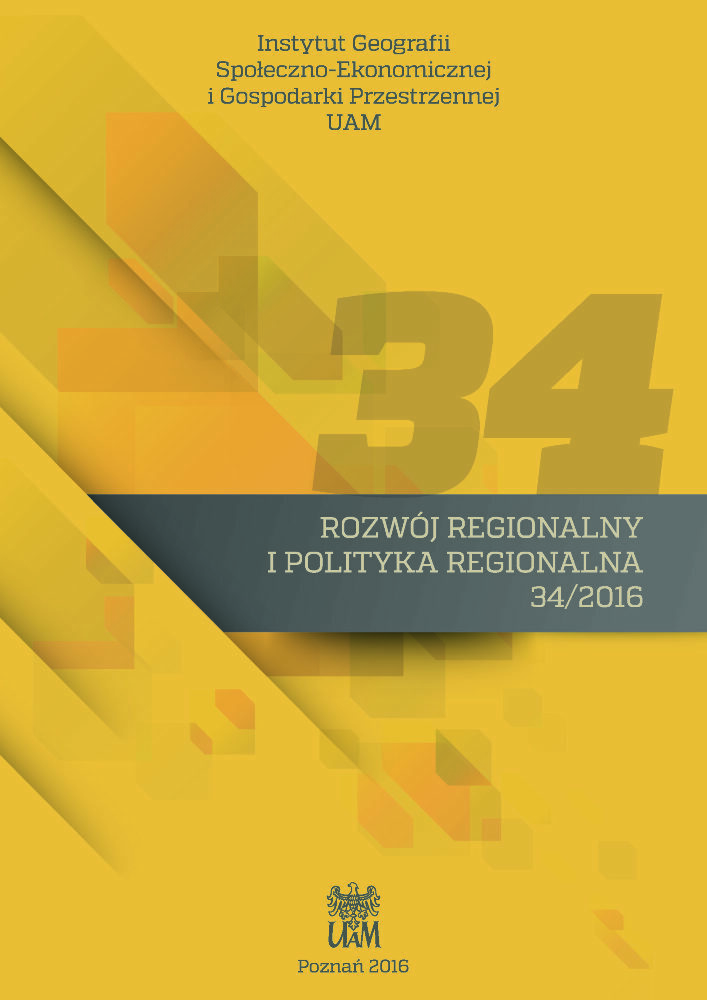Abstrakt
Celem artykułu jest udzielenie odpowiedzi na pytanie, czy występujące w Poznaniu oraz w innych dużych miastach Polski znaczne zróżnicowanie wyników egzaminacyjnych uczniów poszczególnych gimnazjów jest pochodną przede wszystkim zróżnicowania społeczno-przestrzennego miasta, czy też raczej efektem lokalnej polityki edukacyjnej, zwłaszcza z nierestrykcyjnego stosowania zasady rejonizacji kształcenia przez władze lokalne. W artykule przedstawiono rezultaty badań ilościowych dotyczących uwarunkowań zróżnicowania wyników egzaminu gimnazjalnego w Poznaniu. Uzyskane wyniki wykorzystano jako przyczynek do dyskusji nad znaczeniem nierówności społecznych we współczesnej lokalnej polityce edukacyjnej dużego miasta.Bibliografia
Bae H., Chung I.H. 2013. Impact of school quality on house prices and estimation of parental demand for good schools in Korea. KEDI Journal of Educational Policy, 10(1): 43–61.
Bajerski A. 2012. Przemieszczenia uczniów między obwodami szkolnymi a zróżnicowanie wyników publicznych szkół podstawowych i gimnazjów. Przypadek Poznania. Studia Regionalne i Lokalne, 48(2): 62–76
Bajerski A. 2014. Klasyfikacja typologiczna sieci szkół podstawowych w gminach Polski. Przegląd Geograficzny, 86(4): 541–566. DOI: https://doi.org/10.7163/PrzG.2014.4.5
Bajerski A. 2015. Erosion of the school catchment system as local policy: The case of Poznań, Poland. KEDI Journal of Educational Policy, 12(1): 41–60.
Ball S.J. 2003. Class Strategies and the Education Market: The Middle Classes and Social Advantage. Routledge, London. DOI: https://doi.org/10.4324/9780203218952
Ball S.J., Bowe R., Gewirtz S. 1995. Circuits of Schooling: A Sociological Exploration of Parental Choice of School in Social Class Contexts. Sociological Review, 43(1): 52–78. DOI: https://doi.org/10.1111/j.1467-954X.1995.tb02478.x
Ball S.J., Bowe R., Gewirtz S. 1996. School choice, social class and distinction: the realization of social advantage in education. Journal of Education Policy, 11(1): 89–112. DOI: https://doi.org/10.1080/0268093960110105
Banks O. 1968. The Sociology of Education. Batsford, London.
Butler T., Robson G. 2003. Plotting the Middle Classes: Gentrification and Circuits of Education in London. Housing Studies, 18(1): 5–28. DOI: https://doi.org/10.1080/0267303032000076812
Butler T., Hamnett C. 2007. The Geography of Education: Introduction. Urban Studies, 44(7): 1161–1174 DOI: https://doi.org/10.1080/00420980701329174
Bourdieu P. 1977. Cultural Reproduction and Social Reproduction. [W:] J. Karabel, A.H. Halsey (red.), Power and Ideology in Education. Oxford University Press, New York, s. 487–511.
Bourdieu P. 1984. Distinction: A Social Critique of the Judgement of Taste. Harvard University Press, Cambridge, MA.
Bourdieu P., Passeron J.C. 1990. Reproduction: In education, society and culture. Sage Publications, London.
Byun S.-y, Kim K., Park H. 2012. School choice and educational inequality in South Korea. Journal of School Choice, 6(2): 158–183. DOI: https://doi.org/10.1080/15582159.2012.673854
Cheshire P., Sheppard S. 2004. Capitalising the value of free schools: the impact of supply characteristics and uncertainty. The Economic Journal, November F: 397–424. DOI: https://doi.org/10.1111/j.1468-0297.2004.00252.x
Croft J. 2004. Positive choice, no choice or total rejection: the perennial problem of school catchments, housing and neighbourhoods. Housing Studies, 19(6): 927–945. DOI: https://doi.org/10.1080/0267303042000293017
Dolata R. 2008. Szkoła – segregacje – nierówności. Wydawnictwa Uniwersytetu Warszawskiego, Warszawa: DOI: https://doi.org/10.31338/uw.9788323518143
Dolata R. 2010. Cicha rewolucja w polskiej oświacie – proces różnicowania się gimnazjów w dużych miastach. Edukacja. Studia, Badania, Innowacje, 109(1): 51–60.
Dziemianowicz-Bąk A., Dzierzgowski J., Wojciuk A. 2015. Autoselekcja na progu gimnazjum – działania rodziców w kontekście działań szkół i polityki samorządu. Instytut Badań Edukacyjnych, Warszawa.
Feinberg W. 1983. Understanding Education: Toward a Reconstruction of Educational Inquiry. John Wiley, New York.
Gorard S. 1997. School choice in an established market. Ashgate, Aldershot.
Hamnett C., Butler T. 2011. ‘Geography matters’: The role distance plays in reproducing educational inequality in East London. Transactions of the Institute of British Geographers NS, 36(4): 479– 500. DOI: https://doi.org/10.1111/j.1475-5661.2011.00444.x
Hamnett C., Butler T., Ramsden M. 2007. Social background, ethnicity, school composition and educational attainment in East London. Urban Studies, 44(7): 1255–1280. DOI: https://doi.org/10.1080/00420980701302395
Harris R. 2011. Segregation by choice? Social and ethnic differences between English schools. [W:] J. Bakker, E. Denessen, D. Peterss, G. Walraven (red.), International perspectives on countering school segregation. Garant, Apeldoorn, s. 67–82.
Harris R., Johnston R. 2008. Primary Schools, Markets and Choice: Studying Polarization and the Core Catchment Areas of Schools. Applied Spatial Analysis and Policy, 1(1): 59–84. DOI: https://doi.org/10.1007/s12061-008-9002-8
Hargreaves A. 2002. Sustainability of educational change: The role of social geographies. Journal of Educational Change, 3(3): 189–214. DOI: https://doi.org/10.1023/A:1021218711015
Harvey D. 2005. A brief history of neoliberalism. Oxford University Press, Oxford. DOI: https://doi.org/10.1093/oso/9780199283262.001.0001
Koven S.G., Khan M. 2014. School choice acceptance: An exploratory explication. Journal of School Choice, 8(4): 549–566. DOI: https://doi.org/10.1080/15582159.2014.973777
Kučerová S.R., Bláha J.D., Pavlasová Z. 2015. Malé venkovské školy na trhu se základním vzděláváním: Jejich působnost a marketing na příkladu Turnovska. Sociologický časopis/Czech Sociological Review, 51(4): 607–636. DOI: https://doi.org/10.13060/00380288.2015.51.4.209
Leech D., Campos E. 2003. Is comprehensive education really free?: a case study of the effects of secondary school admissions policies on house prices in one local area. Journal of the Royal Statistical Society: Series A (Statistics in Society), 166(1): 135–154. DOI: https://doi.org/10.1111/1467-985X.00263
Maguain D. 2009. La suppression de la sectorisation est-elle une bonne chose? Revue d’économie politique, 119(4): 569–612. DOI: https://doi.org/10.3917/redp.194.0569
Nekorjak M., Souralová A., Vomastková K. 2011. Uvíznutí v marginalitě: vzdělávací trh, romské školy‘ a reprodukce sociálně prostorových nerovností. Sociologický časopis/Czech Sociological Review, 47(4): 657–680. DOI: https://doi.org/10.13060/00380288.2011.47.4.03
Noreisch K. 2007a. Choice as rule, exception and coincidence: Parents’ understandings of catchment areas in Berlin. Urban Studies, 44(7): 1307–1328. DOI: https://doi.org/10.1080/00420980701302320
Noreisch K. 2007b. School catchment area evasion: the case of Berlin, Germany. Journal of Education Policy, 22(1): 69–90. DOI: https://doi.org/10.1080/02680930601065759
Piwowarski R. 1992. Sieć szkolna a dostępność kształcenia. Wydawnictwo Naukowe PWN, Warszawa.
Piwowarski R. 2006. Edukacja z perspektywy lokalnej i międzynarodowej. Instytut Badań Edukacyjnych, Warszawa.
Szlendak T. 2003. Zaniedbana piaskownica: Style wychowania małych dzieci a problem nierówności szans edukacyjnych. Instytut Spraw Publicznych, Warszawa.
Taylor C., Gorard S. 2001. The role of residence in school segregation: placing the impact of parental choice in perspective. Environment and Planning A, 33(10): 1829–1852. DOI: https://doi.org/10.1068/a34123
Tiebout C. 1956. A pure theory of local expenditures. Journal of Political Economy, 64(5): 416–424. DOI: https://doi.org/10.1086/257839
Walaszek M. 2015. Zróżnicowanie przestrzenne dostępności szkół oraz warunków i wyników nauczania w aglomeracji poznańskiej. Uniwersytet im. Adama Mickiewicza w Poznaniu, Poznań (praca doktorska
Licencja
Copyright
© 2016 IGSEiGP, Uniwersytet im. Adama Mickiewicza w Poznaniu
OPEN ACCESS
